Auto-Lookup > Microsoft Excel > Multiple Columns > Google Drive
This topic shows how to create a lookup with a Microsoft Excel file stored in Google Drive as the data source based on multiple columns for the Auto-Lookup form control.
Background and Setup
Prerequisites
- Your Microsoft Excel file must be formatted so AgilePoint NX can read it.
For more information, refer to Rules for Using Microsoft Excel Files with AgilePoint NX
- AgilePoint NX OnDemand (public cloud), or AgilePoint NX Private Cloud or AgilePoint NX OnPremises v8.0 or higher.
Good to Know
- Your Microsoft Excel file must be permanently stored in a supported
repository. The following rules apply:
- The file name must not change for the Excel file.
- Once the lookup is configured, the Excel file must not move from the configured location.
- The names for any folders or other dependent items, such as SharePoint document libraries, in the path to the Excel file must not change.
- There is more than one path to configure a lookup. Make sure you use the document that shows the path for your lookup.
- Auto-Lookup > Microsoft Excel > Name/Value > Box
- Auto-Lookup > Microsoft Excel > Name/Value > File System
- Auto-Lookup > Microsoft Excel > Name/Value > Google Drive
- Auto-Lookup > Microsoft Excel > Name/Value > OneDrive
- Auto-Lookup > Microsoft Excel > Name/Value > OneDrive For Business
- Auto-Lookup > Microsoft Excel > Name/Value > SharePoint
- Auto-Lookup > Microsoft Excel > Multiple Columns > Box
- Auto-Lookup > Microsoft Excel > Multiple Columns > File System
- Auto-Lookup > Microsoft Excel > Multiple Columns > Google Drive
- Auto-Lookup > Microsoft Excel > Multiple Columns > OneDrive
- Auto-Lookup > Microsoft Excel > Multiple Columns > OneDrive For Business
- Auto-Lookup > Microsoft Excel > Multiple Columns > SharePoint
- Some information about third-party integrations is outside the scope of the AgilePoint NX Product Documentation. It is the responsibility of the vendors who create and maintain these technologies to provide this information. This includes specific business use cases and examples; explanations for third-party concepts; details about the data models and input and output data formats for third-party technologies; and various types of IDs, URL patterns, connection string formats, or other technical information that is specific to the third-party technologies. For more information, refer to Where Can I Find Information and Examples for Third-Party Integrations?
How to Start
- On the Auto-Lookup form control configuration screen, on the Configure tab,
click Add Lookup.
For information about how to open this screen, refer to Auto-Lookup form control.
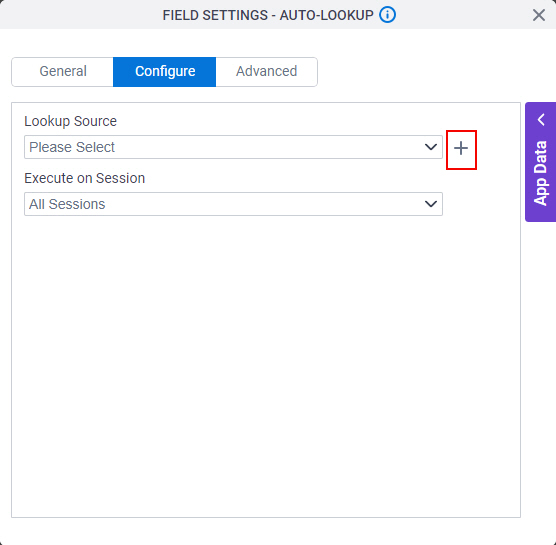
- On the Select Data Source Type screen,
select
Microsoft Excel.
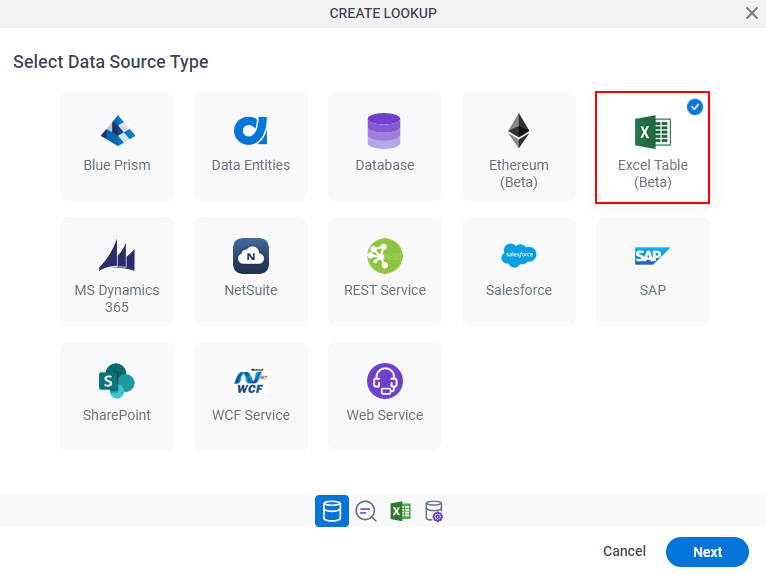
- Click Next.
Lookup Details
Specifies the basic configuration for a lookup.
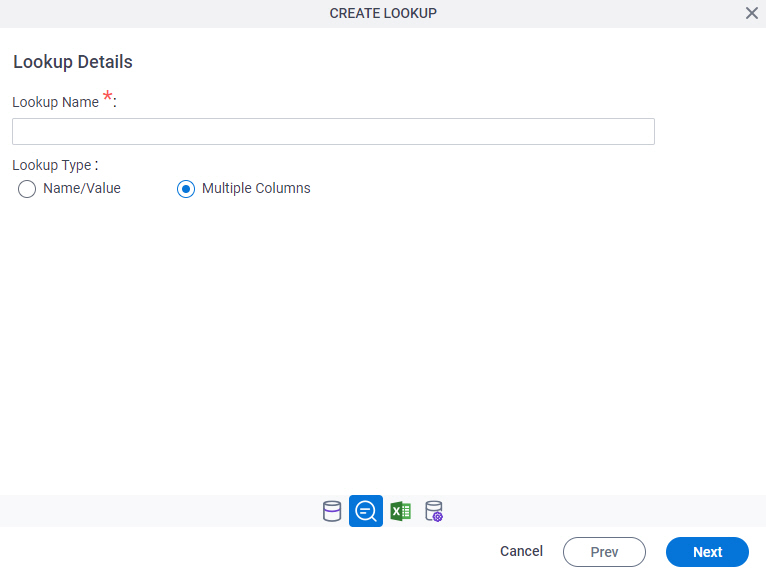
Good to Know
- There is more than one path to configure a lookup. Make sure you use the document that shows the path for your lookup.
- Auto-Lookup > Microsoft Excel > Name/Value > Box
- Auto-Lookup > Microsoft Excel > Name/Value > File System
- Auto-Lookup > Microsoft Excel > Name/Value > Google Drive
- Auto-Lookup > Microsoft Excel > Name/Value > OneDrive
- Auto-Lookup > Microsoft Excel > Name/Value > OneDrive For Business
- Auto-Lookup > Microsoft Excel > Name/Value > SharePoint
- Auto-Lookup > Microsoft Excel > Multiple Columns > Box
- Auto-Lookup > Microsoft Excel > Multiple Columns > File System
- Auto-Lookup > Microsoft Excel > Multiple Columns > Google Drive
- Auto-Lookup > Microsoft Excel > Multiple Columns > OneDrive
- Auto-Lookup > Microsoft Excel > Multiple Columns > OneDrive For Business
- Auto-Lookup > Microsoft Excel > Multiple Columns > SharePoint
Fields
| Field Name | Definition |
|---|---|
Lookup Name |
|
Lookup Type |
|
Choose Document Repository screen
Specifies the repository where your Microsoft Excel file is stored. This section shows the configuration for Google Drive.
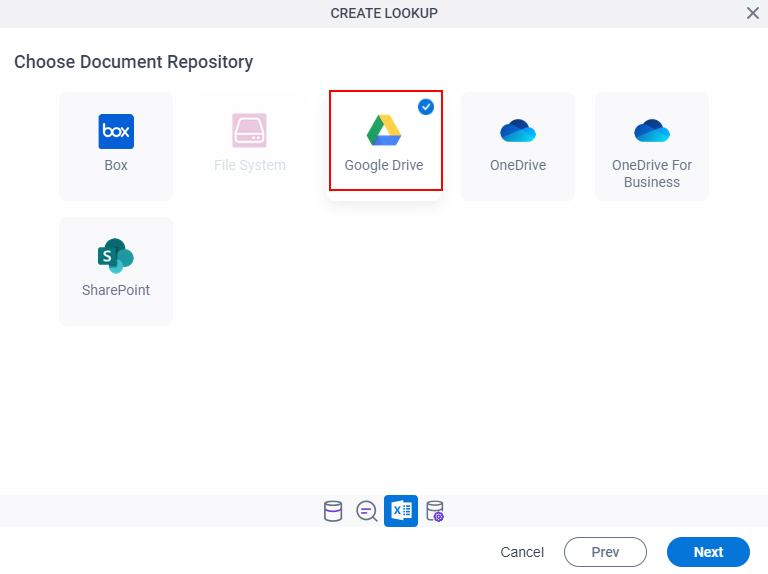
Good to Know
- There is more than one path to configure a lookup. Make sure you use the document that shows the path for your lookup.
- Auto-Lookup > Microsoft Excel > Name/Value > Box
- Auto-Lookup > Microsoft Excel > Name/Value > File System
- Auto-Lookup > Microsoft Excel > Name/Value > Google Drive
- Auto-Lookup > Microsoft Excel > Name/Value > OneDrive
- Auto-Lookup > Microsoft Excel > Name/Value > OneDrive For Business
- Auto-Lookup > Microsoft Excel > Name/Value > SharePoint
- Auto-Lookup > Microsoft Excel > Multiple Columns > Box
- Auto-Lookup > Microsoft Excel > Multiple Columns > File System
- Auto-Lookup > Microsoft Excel > Multiple Columns > Google Drive
- Auto-Lookup > Microsoft Excel > Multiple Columns > OneDrive
- Auto-Lookup > Microsoft Excel > Multiple Columns > OneDrive For Business
- Auto-Lookup > Microsoft Excel > Multiple Columns > SharePoint
Fields
| Field Name | Definition |
|---|---|
|
Select Document Repository |
|
Configure Lookup > Configure Repository tab
Specifies the location of your Microsoft Excel file in Google Drive.
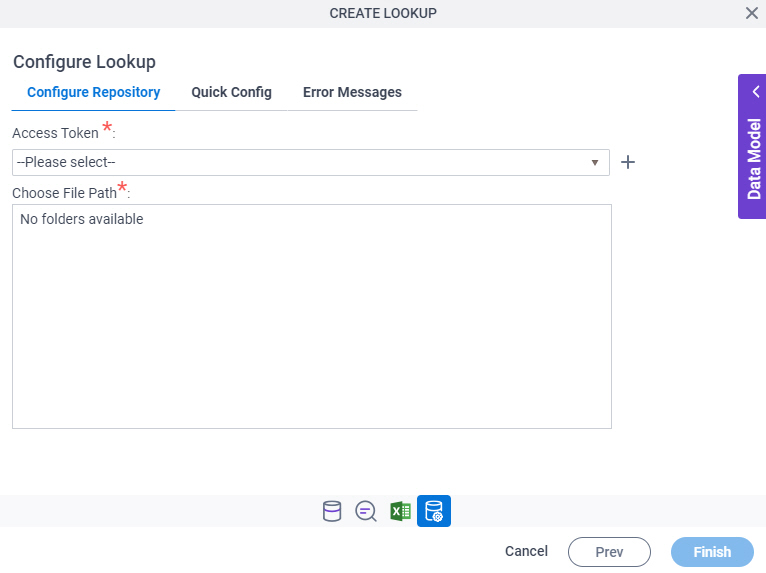
Fields
| Field Name | Definition |
|---|---|
Access Token |
|
Add New |
|
Choose File Path |
|
Configure Lookup > Quick Config tab
Configures a lookup with more than one column from your data source.
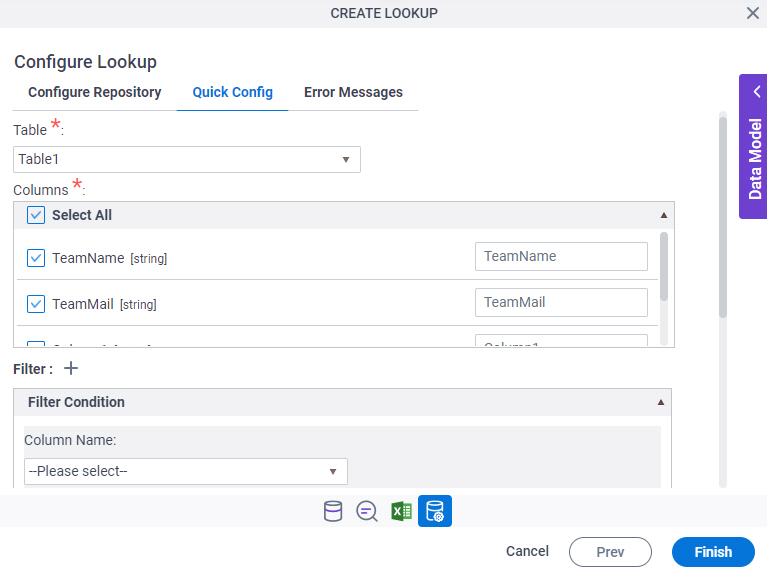
Fields
| Field Name | Definition |
|---|---|
Table |
|
Columns - Name |
|
Columns - Value |
|
Expand |
|
Collapse |
|
Column Name |
|
Operator |
|
Value |
|
Select Nest Type |
|
Delete Filter |
|
Sort By |
|
|
Sort Order |
|
Configure Lookup > Error Messages tab
Configures the message to show if the lookup does not return any data.
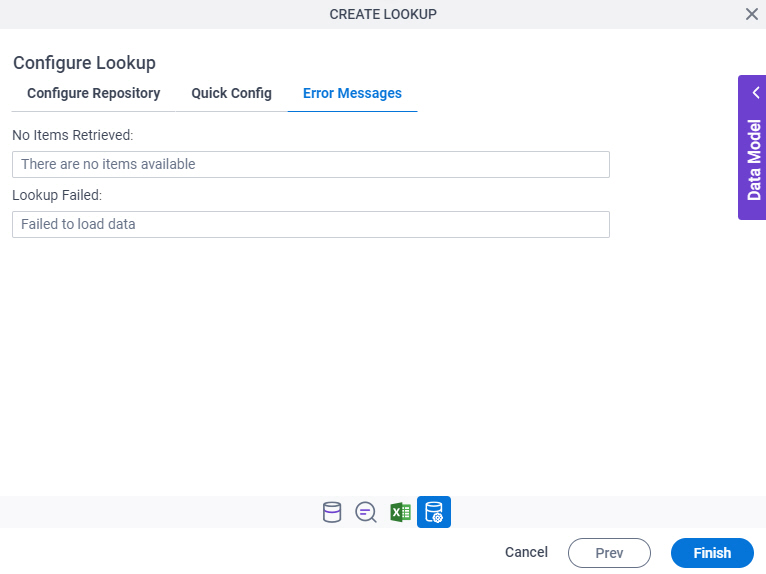
Fields
| Field Name | Definition |
|---|---|
No Items Retrieved |
|
Lookup Failed |
|




